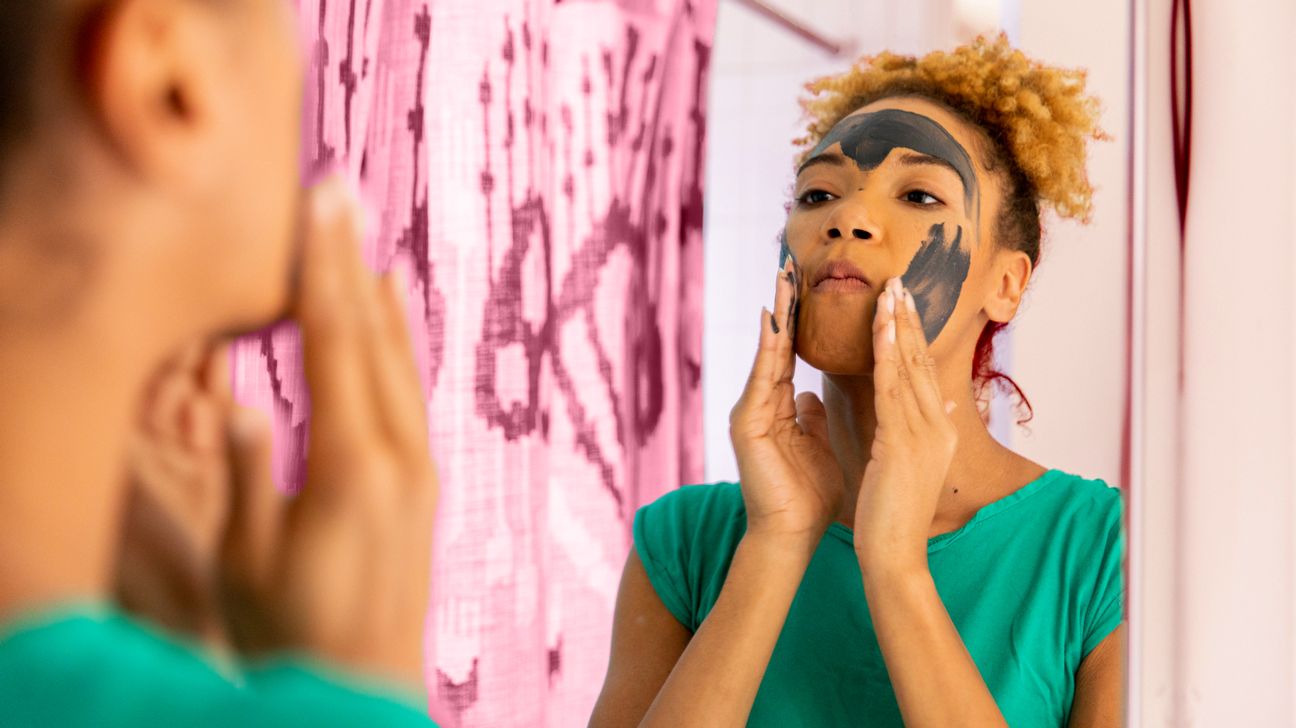There’s no shortage of shocking ingredients found in high end beauty products around the world. The fear factor certainly doesn’t seem to deter consumers from using substances like snail mucus and bee venom. But what about something as scary as volcanic ash?
If it evokes thoughts of slathering yourself with scalding-hot lava, don’t worry. It’s actually a soothing ingredient also known as bentonite clay. Compared to some cringe-worthy concoctions, it’s pretty tame — but effective.

If you’re thinking back to history class when you learned about Mount Vesuvius’ eruption burying Pompeii in volcanic ash, you’re on the right track. That’s the same type of volcanic ash we’re talking about, but with a happier ending.
According to the Volcanic Ashfall Impacts Working Group, volcanic ash consists of fragments of rocks, minerals, and volcanic glass that forms during explosive volcanic eruptions. In the beauty world, these particles serve as nature’s exfoliator.
“Volcanic ash is a combination of natural ingredients including bentonite clay and sulfur,” says Peterson Pierre, MD, a board certified specialist in dermatology and cosmetic dermatology at the Pierre Skin Care Institute in Thousand Oaks, California. “Its high mineral content gives it antimicrobial and antioxidant properties.”
“Volcanic ash is a rich mineral, an antioxidant and antibacterial exfoliant that helps to clarify the skin and make it more beautiful,” explains Anna Guanche, MD, a board certified dermatologist based in Calabasas and Beverly Hills, California, whose celebrity clientele includes Rebecca Romijn, Alyssa Milano, and Brandi Glanville.
“It can be a wonderful ingredient for people with oily, irritated, acne-prone skin because it has a drying effect,” Guanche says.
She says it can also help calm inflammatory skin conditions like eczema and psoriasis and can even deter dandruff.
Volcanic ash benefits for skin
Because its fine particles are highly absorbent (bentonite is actually the ingredient that makes kitty litter clump), volcanic ash helps remove excess oil from your skin and scalp.
“Combine that with its antimicrobial and antioxidant effect and you have a product that can be effective against acne,” says Pierre. “Additionally, volcanic ash removes impurities and delivers a gentle exfoliation, which can leave your skin feeling soft and smooth.”
Thankfully, there’s no need to go sifting around volcanoes to try this beauty trend at home. You can simply reach for a face mask, cleanser, shampoo, or cream that contains volcanic ash or bentonite clay.
This ingredient is sourced from any number of volcanic eruption sites around the world. (Fun fact: Wyoming has 70 percent of the world’s known deposits.) For the best results, follow the instructions on the product you choose.
Volcanic ash face mask
Does your face start to glisten with beads of oil mere minutes after a careful cleansing?
“Patients with oily, acne-prone skin can definitely benefit from incorporating volcanic ash into their skin care routine,” says Pierre. “You’ll experience decreased inflammation, decreased bacteria, decreased oil, and softer, smoother skin.”
Of course, there’s a fine line between reducing oil and turning your skin into the Sahara, so limit your use of products containing volcanic ash to no more than 3 times per week. You can experiment to see what gives you the biggest benefit while minimizing any drying side effects.
Volcanic ash soap
Rough elbows? Scaly shins? Dull complexion? Get your glow back with volcanic ash soap. Its exfoliating properties can help clarify and smooth the skin on your body and face.
But you’ll need to balance out its effects by using humectants (moisturizing agents), either within the same product or separately. “You should look for additional humectants such as ceramides and hyaluronic acid to replenish the moisture in your skin,” says Pierre.
Volcanic ash shampoo
Few things are more annoying than an itchy, flaky scalp — except maybe an ultra-greasy one. If either of these scenarios sounds familiar, reach for a volcanic ash shampoo during your next shower.
“In shampoo, volcanic ash can be helpful to an extremely oily scalp,” says Guanche. “This also can be great for those with dandruff, also known as seborrheic dermatitis.”
The biggest risk of using volcanic ash topically is dry skin and irritation. “That’s why it should be mixed with or followed by the right hydrating ingredients, such as hyaluronic acid,” says Guanche.
Beyond using skin care and beauty products that contain bentonite clay, some people also ingest it, claiming that it can reduce toxins, aid digestion, or relieve certain gastrointestinal issues. But more research is needed to determine how safe and effective this is, so it’s wise to stick with topical applications only.
Case in point: In 2016, the U.S. Food and Drug Administration found that one specific product — Best Bentonite Clay, made in Guthrie, Oklahoma — contained elevated levels of lead. Concerned about the risk of lead poisoning associated with this product, the FDA warned consumers not to ingest it.
Volcanic ash, aka bentonite clay, is an antibacterial and mineral-rich natural material made from the remnants of explosive volcanic eruptions.
When you apply it to your skin or scalp, its exfoliating and oil-absorbing properties may help reduce acne, inflammation, dandruff, and the symptoms of dermatological conditions like eczema and psoriasis.
Look for this ingredient in face masks, shampoos, and cleansers, but don’t overdo it. Start slowly with weekly usage and follow up each application with moisturizer to prevent dryness.

